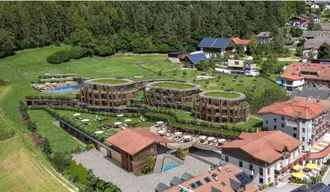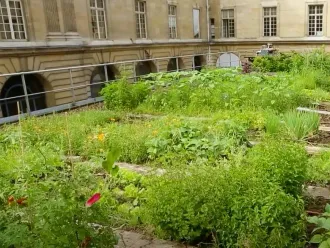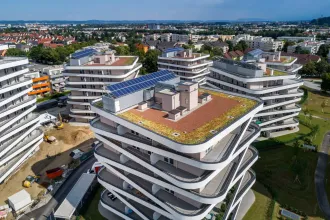Our country pages
Africa
Europe
Search
Large-scale sustainability project

Share article:
Major construction completed within tight deadline
Until its opening in 2018, it was one of the largest construction sites anywhere in Germany – the construction of a Center Parcs resort in Leutkirch in the Allgäu region. With a total investment of around €350 million, the company Groupe Pierre & Vacances Center Parcs converted a former munitions depot into a completely new holiday and leisure resort with a very tight deadline over one winter.
The holiday resort with its enormous tropical swimming paradise with five slides and a long wild water river was created at the foothills of the Alps in the Allgäu region of southern Germany, surrounded by forests and meadows. Center Parcs offers its guests 1,000 different cottages in varying categories ranging from Comfort to Premium and from VIP cottages with their own sauna to exclusive chalet-style cottages for complete relaxation.
Jump to section
Rewarded for its sustainable construction
The construction company was awarded preliminary Gold certification in the “Resort” category by the DGNB – German Sustainable Building Council in 2017 for sustainable quality and for its use of sustainable building materials and systems. This certification looked specifically at the integration of architecture and infrastructure into the existing nature and landscape.
The use of sustainable building materials could be proven to the DGNB thanks to Environmental Product Declarations (EPDs). EPDs look at the life-cycle characteristics of the materials, as well as the impact of the manufacturing process on the environment, how long the materials can be used for and their overall energy consumption. These data form the basis of the evaluation by the DGNB, and all of the information on the roofing tiles and underlay required by the Council for its evaluation system is available.
750 holiday cottages roofed using BMI Braas
Complete Braas roofing systems were employed on all of the 750 prefabricated wooden holiday cottages. The roofing materials used were the Harzer Pfanne 7 roof tile in combination with the 7GRAD roofing system with Harzer Pfanne F+ roof tiles. The roofing contract was split among different companies: 401 of the holiday cottages went in a consortium to Bernhardt Holzbau GmbH & Co. KG from Weingarten who took on the work for Lot A which consisted of all of the supporting construction work.
Werner Dangel Holzbau GmbH from Bad Wurzach then took responsibility for installing the Harzer Pfanne and Harzer Pfanne F+ roof tiles. Lot B, which consisted of the supporting construction work and the installation of roof tiling on 349 cottages, went to master roofer Stephan Weidt from Zwickau.
Cottages with differing roof pitches
All the construction elements on the holiday cottages were built from wooden structures and lowered onto the building with a crane. The different cottage types were assembled in modular form and then fitted together later. This included the roofing elements which were constructed in advance and produced in a factory. Planning for the different cottage types included a range of different pitches on the roofs ranging from 30° to 12.5°.
The solid wood for construction (KVH) frames with a strength of 6/19 cm were installed on MFP type P5 particleboard in accordance with standard EN 312 for load-bearing purposes for use in humid areas. The particleboards themselves are both vapour and airtight and the spaces created between them were filled with glass wool insulating material. On the upper surface, the frames were covered with 22 mm-thick wooden soft fibre panels. Then, after putting into position using the crane, the roof elements were joined together using fully threaded screws with friction locking to keep them in place. Joint areas were finally sealed to form an airtight connection.
Construction under challenging conditions
The extremely strict timeline meant that construction had to continue during the winter period, which meant dealing with temperatures of up to -15°C and snowfalls of over 1 metre. On top of that, it wasn’t always easy for suppliers to locate the correct construction site due to the large number of simultaneous construction tasks.
To provide the roof surfaces and wooden soft fibre panels with additional protection during the long winter period, the carpenters and roofers added an extra layer of Divoroll Ecotech/Durotec 2S underlay to the roofs with a pitch of 30°. This meant that the original plan for a time-consuming watertight bonding of the wooden soft fibre panel with primer and adhesive tape was no longer required.
Breathable underlay as temporary waterproofing
The breathable underlay offers great base properties for laying on formwork or dimensionally stable insulation, or as a sarking and lining membrane. The integrated double adhesive area ensures airtight and watertight installation. According to the data sheets from the German Central Association of the German Roofing Trade (ZVDH), the underlay is suitable as temporary waterproofing and classed according to UDB-A and USB-A. Resistance to driving rain was verified in accordance with the “Determination of driving rain resistance of breathable membranes of the TU Berlin”.
The Divoroll Ecotec/Durotec 2S was secured to the frames using 40/60 mm counter battens. In warm weather, self-foaming Divoroll sealing agent can be used under the counter battens. In more challenging weather conditions, the roofers decided to use Divoroll nail sealing tape to prevent perforation. Super-absorbent material woven into the tape react with moisture to build a seal impenetrable to water.
With the correct materials used in combination with the underlay, this construction is considered as suitable for creating temporary waterproofing according to the guidelines of the ZVDH. With the roof surfaces fixed in place, it was possible to mount the cross joists. To cover the rooftops, the roof is used classic matt granite Harzer Pfanne 7 roof tiles. Thanks to their large dimensions, these roof tiles are perfect for large areas as they can be installed more efficiently.
7GRAD roof
The installers faced a much greater challenge when it came to the flat inclined roofs with a planned pitch of 12.5°. By using the Braas 7GRAD roofing system, Braas tiles could be installed on a roof with an incline of just 7°. For a complete Braas 7GRAD roof installation, Harzer Pfanne F+ roof tiles with rain barrier and Divoroll Top RU on formwork with matched Divoroll sealing agent or nail sealing tape and Divoroll sealant must also be used. Other component parts for this installation included snow retention blocks which prevented the snow from sliding off the roof.
The use of Harzer Pfanne F+ roof tiles with integrated rain barrier was a particularly good idea as they are visually identical to Harzer Pfanne 7 tiles. This resulted in an especially harmonic panorama when looking over the roofs at different inclines.
Complete roofing systems for the best protection against humidity
As a complete roofing system for 7° - 12° roof pitches, the system installed with its watertight but highly breathable supporting construction offers excellent conditions for a long-lasting dry roof construction. Humidity from inside the building is free to escape, but any water from outside is unable to penetrate the surface.
The basis for the functional reliability of the Braas 7GRAD roofing system is that a special rooftop made of Harzer Pfanne F+ roof tiles is used. Of course, these tiles also come with the well-known 30-year Braas guarantee. Other system components, such as the supporting construction with Divoroll Top RU, were also integral to the overall structure of the roofs.
Safety even below standard roof pitches
Traditionally each roofing material has a standard minimum roof pitch which can only be reduced by taking additional measures. The guidelines issued by the German Central Association of the German Roofing Trade (ZVDH) are of importance in such cases, as they also contain information on experience with individual building products.
The aim of the guidelines is to describe the perfect technical conditions for general applications and thus to set the standard for contractors for the levels of quality their work needs to achieve. The guidelines are also important for the constructor or planner, as they set out the work the contractor needs to complete.

Masterful cooperation
The holiday resort opened its doors in autumn 2018 and offers visitors accommodation in cosy cottages with pitched roofs and an atmosphere of calm and relaxation. It is also a starting point for numerous cultural and sporting activities both throughout the summer and winter seasons. The companies involved managed to construct the entire holiday resort in record time, even when faced with very challenging weather conditions. Numerous consultation phases took place with the carpenters, roofers, suppliers and planners working together in complete coordination to finish the project successfully.
Details
Property: Center Parcs (Allgäu)
Project: new construction
Building contractor: Groupe Pierre & Vacances Center Parcs
Planner: ANSSP Architekten NAEVE SCHROFF SCHÄFER Partnerschaft mbB (Hamburg)
Supporting construction and roofing: Werner Dangel Holzbau GmbH (Bad Wurzach), Bernhardt Holzbau GmbH & Co. KG (Weingarten), Master roofer Stephan Weidt (Zwickau)
Products used:
- 7GRAD roof with
- Divoroll Top RU
- Divoroll nail sealing tape
- Divoroll sealant
- Harzer Pfanne 7 tiles
- Ecotec/Durotec 2S
Project Highlights
Project Highlights
- Property: Center Parcs (Allgäu)
- Project: new construction
- Building contractor: Groupe Pierre & Vacances Center Parcs
- Planner: ANSSP Architekten NAEVE SCHROFF SCHÄFER Partnerschaft mbB (Hamburg)
- Supporting construction and roofing: Werner Dangel Holzbau GmbH (Bad Wurzach), Bernhardt Holzbau GmbH & Co. KG (Weingarten), Master roofer Stephan Weidt (Zwickau)
- Products:
- 7GRAD roof with
- Divoroll Top RU
- Divoroll nail sealing tape
- Divoroll sealant
- Harzer Pfanne 7 tiles
- Ecotec/Durotec 2S



